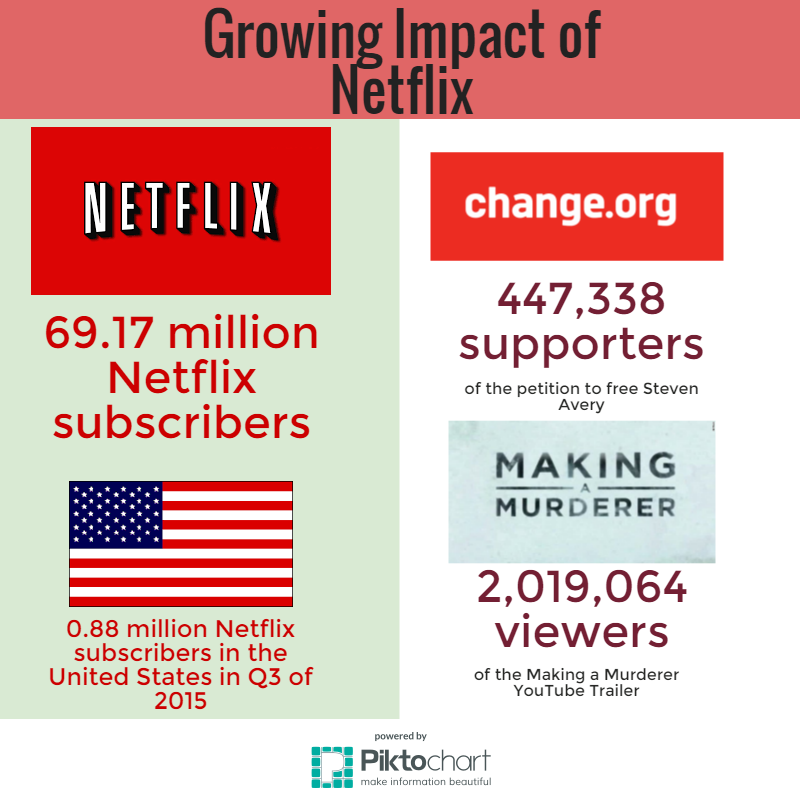Media Matters: Online streaming platforms need to better disclose biases and dramatizations
The infographic above details Netflix’s viewership, as well as the size of the audiences involved with “Making a Murderer.” With each series on Netflix and similar platforms so popular now, distinguishing between dramatic content and documentary content will prove necessary to improve audience judgment.
January 19, 2016
As Netflix’s competitors expand and release new content, Netflix’s newest strategy to retain subscribers has been a series of Netflix-exclusive TV series and films. One of its most popular recent additions, Making a Murderer, focuses on the events surrounding the two criminal cases of Steven Avery and has garnered more public recognition than any other Netflix documentary in the past.
The ten-episode series is an enjoyable documentary in its own right, but the show owes much of its success to Netflix’s online promotion. Netflix US & Canada’s official YouTube account, a channel devoted to previews of Netflix’s primarily scripted content, posted a trailer as well as the first episode.
By advertising a documentary alongside comedies and dramas, Netflix makes it more difficult to differentiate television based in real world situations from shows completely faithful to true events. Although scripted shows such as Beasts of No Nation and Narcos have been successful, both attracting over 3 million views, audiences understand that the shows dramatize true events. As a result, the series have a limited influence on the way viewers think.
However, when historical TV shows or movies and documentaries are advertised in trailers shot in the same style in the same YouTube channel, the audience may not distinguish reality and dramatization. Even Making a Murderer, a documentary praised for its comprehensive coverage of Steven Avery’s alleged crimes, devotes more screen time to the lawyers supporting his innocence which might have led to the overwhelming support for Avery’s freedom.
The petition proves that when controversial media is taken at face value it can influence the world profoundly. With that power in mind, Netflix and other video streaming companies must explicitly segregate the advertising of documentaries and scripted series as well as outline the biases and creative liberties in their content before a viewer even downloads the first episode. Only then can the audience evaluate the shows and movies they watch with appropriate judgment.



















![“[Building nerf blasters] became this outlet of creativity for me that hasn't been matched by anything else. The process [of] making a build complete to your desire is such a painstakingly difficult process, but I've had to learn from [the skills needed from] soldering to proper painting. There's so many different options for everything, if you think about it, it exists. The best part is [that] if it doesn't exist, you can build it yourself," Ishaan Parate said.](https://harkeraquila.com/wp-content/uploads/2022/08/DSC_8149-900x604.jpg)




![“When I came into high school, I was ready to be a follower. But DECA was a game changer for me. It helped me overcome my fear of public speaking, and it's played such a major role in who I've become today. To be able to successfully lead a chapter of 150 students, an officer team and be one of the upperclassmen I once really admired is something I'm [really] proud of,” Anvitha Tummala ('21) said.](https://harkeraquila.com/wp-content/uploads/2021/07/Screen-Shot-2021-07-25-at-9.50.05-AM-900x594.png)







![“I think getting up in the morning and having a sense of purpose [is exciting]. I think without a certain amount of drive, life is kind of obsolete and mundane, and I think having that every single day is what makes each day unique and kind of makes life exciting,” Neymika Jain (12) said.](https://harkeraquila.com/wp-content/uploads/2017/06/Screen-Shot-2017-06-03-at-4.54.16-PM.png)








![“My slogan is ‘slow feet, don’t eat, and I’m hungry.’ You need to run fast to get where you are–you aren't going to get those championships if you aren't fast,” Angel Cervantes (12) said. “I want to do well in school on my tests and in track and win championships for my team. I live by that, [and] I can do that anywhere: in the classroom or on the field.”](https://harkeraquila.com/wp-content/uploads/2018/06/DSC5146-900x601.jpg)
![“[Volleyball has] taught me how to fall correctly, and another thing it taught is that you don’t have to be the best at something to be good at it. If you just hit the ball in a smart way, then it still scores points and you’re good at it. You could be a background player and still make a much bigger impact on the team than you would think,” Anya Gert (’20) said.](https://harkeraquila.com/wp-content/uploads/2020/06/AnnaGert_JinTuan_HoHPhotoEdited-600x900.jpeg)

![“I'm not nearly there yet, but [my confidence has] definitely been getting better since I was pretty shy and timid coming into Harker my freshman year. I know that there's a lot of people that are really confident in what they do, and I really admire them. Everyone's so driven and that has really pushed me to kind of try to find my own place in high school and be more confident,” Alyssa Huang (’20) said.](https://harkeraquila.com/wp-content/uploads/2020/06/AlyssaHuang_EmilyChen_HoHPhoto-900x749.jpeg)






